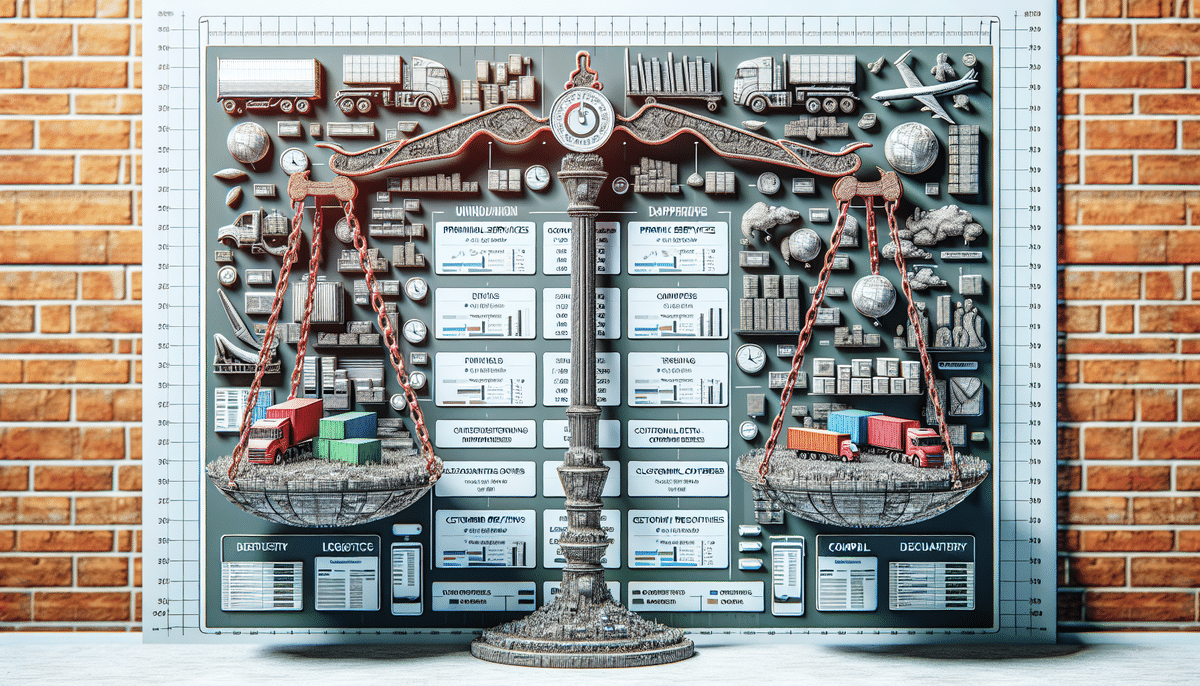Overview of Fulfillment Services: Fulfillment by Amazon (FBA) vs Flowspace
For e-commerce businesses, selecting the right fulfillment partner is crucial for operational efficiency and customer satisfaction. Fulfillment by Amazon (FBA) and Flowspace are two prominent fulfillment services that offer distinct advantages and cater to different business needs.
What is Fulfillment by Amazon (FBA)?
FBA is a service provided by Amazon that enables sellers to store their products in Amazon's fulfillment centers. When a customer places an order on Amazon, the company manages the packaging, shipping, and delivery of the product.
To utilize FBA, sellers create a seller account on Amazon, add their product listings, and send their products to Amazon's fulfillment centers. Once there, the products become eligible for Amazon Prime and other promotional features, increasing visibility and sales potential.
One major advantage of FBA is that it allows sellers to focus on marketing and product development while Amazon handles logistics. Additionally, accessing Amazon's vast customer base and its renowned customer service can enhance customer satisfaction and reduce return rates.
What is Flowspace?
Flowspace is an on-demand warehousing and fulfillment service that offers flexible storage solutions tailored to a business's current needs. Unlike traditional warehousing, Flowspace allows businesses to adjust their warehouse space dynamically, manage inventory efficiently, and gain real-time visibility into stock levels.
Using Flowspace involves signing up for an account, uploading product information to the platform, and Flowspace handling the picking, packing, and shipping of products to customers. Additionally, Flowspace offers services such as reverse logistics, kitting, and product labeling.
Flowspace's ability to scale operations quickly without significant upfront investments in warehousing makes it an attractive option for growing businesses. Access to a nationwide network of fulfillment centers also allows businesses to store products closer to their customers, reducing shipping times and costs.
Comparative Analysis: FBA vs Flowspace
Pros and Cons
Pros of Fulfillment by Amazon (FBA)
- Amazon's trusted brand and extensive global reach expose your products to a broad audience.
- Amazon manages all shipping and logistics, including customer service and order tracking.
- Eligibility for Amazon Prime enhances attractiveness to customers seeking fast delivery.
Cons of Fulfillment by Amazon (FBA)
- FBA can be costly, with fees accumulating significantly for businesses with high sales volumes.
- Sellers lose some control over shipping and handling processes, adhering to Amazon's policies and restrictions.
- Potential for shipment errors and delays, as fulfillment and customer service are managed by Amazon.
Pros of Flowspace
- Flexible storage options allow businesses to adjust warehouse space based on demand.
- Cost-effective shipping solutions help reduce overhead expenses.
- Real-time inventory visibility enables accurate stock management.
Cons of Flowspace
- Flowspace is less recognized compared to Amazon, possibly requiring additional marketing efforts.
- Limited delivery options compared to FBA, which might affect customer satisfaction and sales.
- Additional costs for services like kitting and labeling.
Fulfillment Fees
FBA fees depend on the number and size of items sold, encompassing storage fees, fulfillment fees, referral fees, and other charges. These fees can accumulate quickly, especially for high-volume products. According to Statista, the average FBA fees for sellers in 2023 have increased by approximately 5% compared to the previous year, reflecting Amazon's evolving pricing strategies.
Flowspace, in contrast, offers customized pricing based on storage needs and services required. Businesses can obtain a free online quote to understand their specific costs. Flowspace's pricing structure tends to be more transparent and scalable, accommodating both small and large businesses without exorbitant fees.
Shipping Options
FBA provides a variety of shipping options, including same-day delivery, two-day delivery, and free shipping for Amazon Prime members. This wide range boosts customer satisfaction and conversion rates.
Flowspace allows businesses to select their shipping carriers, schedule orders, and design shipping processes according to customer needs. While FBA may offer more integrated shipping options, Flowspace provides greater flexibility for businesses to negotiate rates with carriers like UPS, FedEx, and USPS, potentially reducing shipping costs.
Inventory Management
FBA offers an easy-to-use inventory system integrated with Amazon's platform, facilitating sales tracking, automatic restocking, and stock level management. This integration simplifies inventory oversight for sellers operating primarily on Amazon.
Flowspace provides advanced inventory management solutions, including real-time monitoring, automated restocking alerts, and detailed product movement reports. This comprehensive approach allows businesses to maintain precise control over their inventory across multiple warehouses, enhancing operational efficiency.
Customer Service
With FBA, Amazon handles customer service, returns, and exchanges, allowing businesses to focus on sales and product development without being burdened by customer inquiries.
Flowspace offers customer service support for fulfillment-related queries, while businesses manage other customer service aspects like delivery issues and returns. However, Flowspace provides a personalized customer service experience, with account managers dedicated to addressing specific business needs and optimizing fulfillment performance.
Shipping Speeds
FBA is renowned for its fast shipping options, including two-day and same-day delivery for Amazon Prime-eligible products. This speed enhances customer satisfaction and loyalty.
Flowspace provides customizable shipping options based on the chosen carrier and business requirements. While delivery speeds can vary, Flowspace enables businesses to optimize shipping strategies to balance cost and speed effectively.
Scalability
Both FBA and Flowspace support business scalability by allowing increased product storage in fulfillment centers. However, FBA's stringent policies and fee structures may limit scalability for smaller businesses.
Flowspace's flexible storage solutions are designed to accommodate fluctuating inventory levels, making it simpler for businesses to scale up or down as needed without significant overhead costs.
Case Studies: Real-Life Examples of Businesses Using FBA and Flowspace
Case studies demonstrate the effectiveness of both FBA and Flowspace in enhancing business operations and growth:
- Business A: A small-scale e-commerce business transitioned to FBA, resulting in reduced time spent on customer service and increased focus on product development and marketing, which boosted sales by 30% within a year.
- Business B: A mid-sized retailer adopted Flowspace's on-demand warehousing, achieving a 70% reduction in storage costs and a 40% increase in order fulfillment speed, enabling them to meet growing customer demand efficiently.
Integration with E-commerce Platforms
Integrating fulfillment services with your e-commerce platform is essential for seamless operations:
Integrating FBA
To integrate FBA, sellers must follow the instructions provided on Amazon Seller Central to link inventory listings and manage orders within the FBA system. Amazon provides extensive documentation and support to facilitate this integration.
Integrating Flowspace
Flowspace offers straightforward integration options, allowing businesses to export data and send it directly through their API. Most major e-commerce platforms, such as Shopify and WooCommerce, can be connected to Flowspace, enabling automatic synchronization of orders and inventory.
Security Measures: Ensuring the Safety of Your Products
Both FBA and Flowspace implement robust security protocols to safeguard products:
- Fulfillment by Amazon (FBA): Provides 24/7 surveillance monitoring, comprehensive insurance coverage, and strict fire protection measures. Amazon's established reputation and adherence to international security standards ensure high levels of product safety.
- Flowspace: Offers similar security features, including round-the-clock surveillance, insurance options, and stringent fire prevention systems. Additionally, Flowspace employs advanced access controls and regular security audits to maintain the integrity of stored products.
While both services offer strong security measures, FBA benefits from Amazon's global brand trust and consistent enforcement of security protocols, making it a reliable choice for businesses prioritizing product safety.
Conclusion
Choosing between Fulfillment by Amazon (FBA) and Flowspace depends on your business's specific needs, budget, and growth objectives. FBA offers a trusted brand, extensive delivery options, and comprehensive customer service support, making it ideal for businesses seeking vast exposure and streamlined logistics. However, FBA's higher costs and less flexible policies may be a barrier for smaller or niche businesses.
Conversely, Flowspace provides a cost-effective, flexible alternative with advanced inventory management and personalized customer service, making it suitable for businesses aiming to control overhead costs and tailor their fulfillment processes. Ultimately, the best fulfillment solution aligns with your business strategy, ensuring efficient operations and customer satisfaction.




















